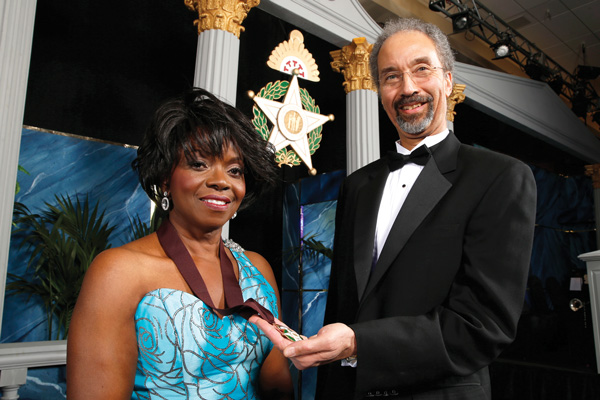Judge Miles-LaGrange Inducted into Oklahoma Hall of Fame

At age 16, Vicki Miles-LaGrange ’74 learn-ed a painful lesson about inequality. As she recounts, after being overwhelmingly elected by 416 peers as Governor of the 1970 Oklahoma Girls State, sponsored by the American Legion Auxiliary, she was denied the opportunity to represent Oklahoma in Washington, DC, because she was a “Negro.” The tradition had been that the Auxiliary selected the Governor and Lt. Governor to represent Oklahoma at Girls’ Nation in DC.
“Although it was a bitter pill to swallow, I had good parents who encouraged me not to take it personally and to keep moving forward,” she says.
And move forward, she did. The incident would shape her career to advocate for equality for all people. In 1993, President Bill Clinton appointed her U.S. Attorney for the Western District of Oklahoma. In 1994, she was again appointed by President Clinton as the first black federal judge in the six-state 10th Circuit, and in 2008, invested as the first black Chief U.S. District Judge in the Western District of Oklahoma. She also was the first black woman elected to the Oklahoma State Senate.
On November 7 of last year Miles-LaGrange was inducted into the Oklahoma Hall of Fame in an Oklahoma City ceremony. Induction is the highest honor Oklahomans can receive for their contributions to the state. She joined six other inductees, whose portraits will hang in a gallery at the Oklahoma Heritage Association’s Gaylord-Pickens Museum.
During the ceremony, Richard Roberts ’74, Chief U.S. District Judge for the District of Columbia, introduced his former classmate and praised her desire to bring impartiality to the judicial system.
“She’s tough as nails, but she’s as fair as they come,” he said after the event. “I can’t promise you that all of us are that way, but she certainly is. Vicki’s parents were teachers who came up the hard way and worked hard for what they got. They instilled in their children a tremendous work ethic and had them abide by what’s right and always do the right thing.”
Miles-LaGrange’s orientation toward justice led to her appointment by the late U.S. Supreme Court Chief Justice William Rehnquist to the U.S. Judicial Conference Committee on International Judicial Relations. In that role, she engaged in rule of law work in civil and human rights in countries including Rwanda, China, Brazil, Russia, and Sudan. She was recognized for her work in Rwanda with the Oklahoma Journal Record Woman of the Year Award, the Oklahoma Bar Association’s Fern Holland Courageous Lawyer Award, and the Oklahoma Public School Foundation Wall of Fame Humanitarian Award. In addition, she was recently awarded the Federal Bar Association’s Sarah T. Hughes Civil Rights Award for her civil and human rights work.
Miles-LaGrange learned to appreciate social studies and government at a young age. She graduated cum laude from Vassar and then went on to earn her law degree at Howard University, where she was an editor of the Howard Law Journal. “My dad always said education was a way up and a way out,” Miles-LaGrange told the Oklahoman. “In our house, it was nonnegotiable.”
Miles-LaGrange says she would like to be remembered as more than a series of “firsts.” “Above, all, I’m a career public servant,” she notes. It all goes back to President John F. Kennedy’s “Ask not what your country can do for you; ask what you can do for your country” speech. She says she was so moved by it that she wrote the president a letter that was answered by one of his advisers. The letter hangs on the wall of her chambers today.
Each month, she is reminded of how important it is to serve her country when her duties as Chief Judge enable her to preside over monthly naturalization proceedings. “I look into the faces of our new citizens and note their eagerness and excitement about the privileges and responsibilities of citizenship,” she says.
She can often be found mentoring students of various backgrounds who want to pursue careers in public service. Looking back over her own career, she concludes, “For a kid who loved social studies and government as much as I did, the chance to serve others has been the opportunity of a lifetime.”
—Andy Faught
